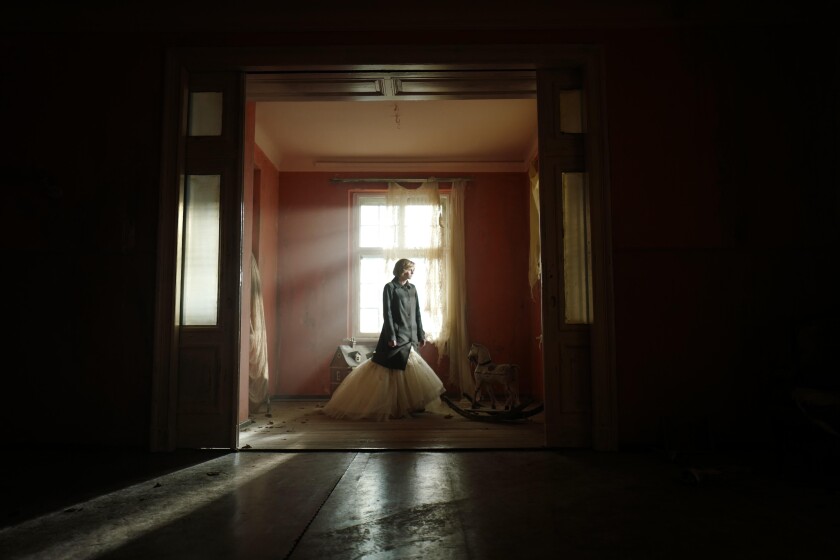The Times is committed to reviewing theatrical film releases during the COVID-19 pandemic. Because moviegoing carries risks during this time, we remind readers to follow health and safety guidelines as outlined by the Centers for Disease Control and Prevention and local health officials.
“Spencer” unfolds over three chilly days at Sandringham, a sprawling manor in the Norfolk countryside. It begins on Christmas Eve, but the mood is far from celebratory. Heavy-duty vehicles roll along in grim procession, every tire just barely avoiding a pheasant lying dead in the road. (Consider it a mercy killing; the bird was reared for the upcoming Boxing Day hunt.) Armed soldiers march across the courtyard, bearing cargo in tightly sealed containers. Is it a cache of rifles? No, just fresh meat and vegetables for the feast, to be overseen by a battle-weary chef (Sean Harris) who urges his staff to work quietly: “They can hear you.”
“They,” of course, are the royal family, all of whom will arrive shortly, sans their most famous and famously troublesome member. In one of her latest breaches of protocol, Diana, Princess of Wales (a mesmerizing Kristen Stewart), has ditched her security detail and driven down from London herself, getting lost and distracted along the way. Arriving hours late for an event run with military precision, Diana comes tearing up the drive like a stray missile, an image reinforced by the bird’s-eye view of her convertible approaching the compound. Don’t call “Spencer” a biopic; in these moments, it’s closer to a war movie.
The battle lines are clearly drawn. It’s December 1991 and the death throes of Diana’s marriage have begun, though neither Chilean director Pablo Larraín nor British screenwriter Steven Knight have much use for strict facts or timelines. They trust that their audience knows the whole tortured saga well, perhaps from watching the countless shows and movies made about Diana’s life or closely following the headlines that hounded her to the grave and beyond. Now, 24 years after her death, we find ourselves in the midst of a full-blown Diana-ssance, her legacy immortalized anew in Netflix programs like “The Crown” and (oof) “Diana: The Musical” and pointedly evoked amid the royal family’s latest public contretemps. Her place in the hearts of a monarchy-obsessed public feels more secure than ever.
All this might have made “Spencer” seem repetitive at best and exploitative at worst. Instead, it’s freed Larraín and Knight from any obligation to be comprehensive or definitive, much less adhere to the art-deadening conventions of the prestige Hollywood biopic. Why consign a heroine of Diana’s iconic stature and expressive power to one genre? The royal family’s travails have long been likened to that of a soap opera, but “Spencer,” even as it conjures the emotional extravagance of a first-rate melodrama, refuses to be hemmed in. It’s a historical fantasia, a claustrophobic thriller and a dark comedy of manners, all poised on a knife’s edge between tabloid trash and high art.

Kristen Stewart as Princess Diana in the movie “Spencer.”
(Neon)
Most of all, it’s a portrait of a woman under siege. Increasingly depressed and isolated, Diana refuses to see her in-laws or wear the dresses (brilliantly designed by Jacqueline Durran) that have been set aside for each occasion. (Every garment bag bears the label “P.O.W.,” which can of course be read two ways.) From her perspective, it’s hardly a fair fight: She’s trapped in enemy territory and gravely outnumbered. But where the audience is concerned, she has an unshakable emotional advantage. This is, after all, Diana, the people’s princess, whose glamorous beauty and warm, irrepressible humanity have long dominated public sympathies and rebuked the frosty institution she married into. No less important, this is Kristen Stewart, reluctant Hollywood royalty incarnate, hurling herself into the kind of dazzling celebrity-as-celebrity star turn that reduces co-stars to commoners and sets Oscar prognosticators swooning.
I wouldn’t ordinarily mean that as a compliment. But Stewart has long confounded our notions of the ordinary and the extraordinary, and her brilliantly prismatic performance is both a natural extension of her image and a nervy departure from it. Her best earlier roles were wittily subversive riffs on her own mega-celebrity: Playing lowly assistants to the stars in Olivier Assayas’ “Clouds of Sils Maria” and “Personal Shopper,” Stewart electrified the camera’s gaze even as she seemed to deflect it. Her flinty naturalism took on a paradoxical radiance.
In “Spencer,” she achieves an equally remarkable alchemy through radically different means. Those means might look conventional on the surface: a blond wig, a British accent and an array of actorly mannerisms — hushed, breathy intonations, nervously darting eye movements — that are a little jarring on first encounter. But by the time Diana arrives at Sandringham, where she retreats to her chambers and shows little intention of emerging, the illusion has eerily seized hold.
What gives Stewart’s performance its specific resonance goes far beyond adroit technique; it’s the sense of a spiritual kinship, unarticulated but unmistakable, forged by an actor who knows a thing or two about the trappings of fame and the cruel churn of the gossip mill. Stewart doesn’t go easy on the character; she allows Diana her moments of spite and self-pity, and those who’ve always dismissed the princess as a self-willed victim or a scheming manipulator will not find their opinions entirely refuted. Even still, Stewart’s underlying compassion never wavers. Always good at projecting awkwardness and insecurity, she particularly comprehends Diana’s innate shyness, her squirming unease in these hostile surroundings.
Her discomfort is exacerbated at every turn by Larraín’s filmmaking, which often employs the feverish language of psychological horror — and more than a whisper of camp — to conjure a mood of relentless extremity. The camera, wielded by the great cinematographer Claire Mathon (“Portrait of a Lady on Fire,” “Atlantics”), chases Diana down corridors and stalks her around her chambers where she seethes and despairs. The music shudders with all the raw-nerves lyricism you’d expect from Jonny Greenwood (adding another remarkable score to an oeuvre that includes “There Will Be Blood” and “You Were Never Really Here”). Diana’s wardrobe becomes a gorgeous prison, from the string of pearls that repeatedly tightens around her neck to the stunning Chanel gown she wears as she retches into a toilet.

Kristen Stewart in the movie “Diana.”
(Pablo Larraín/Neon)
And amid the shadows of Sandringham (handsomely appointed by production designer Guy Hendrix Dyas), cinematic allusions spawn and multiply. Larraín devotees will naturally incline their thoughts toward his earlier curdled fairy tale, “Jackie,” which starred Natalie Portman as the newly widowed Jacqueline Kennedy, and with which “Spencer” would make a fabulous transatlantic double bill. The affectionate moments Diana shares with her adoring sons, Prince William (Jack Nielen) and Prince Harry (Freddie Spry), briefly take on spooky candlelit overtones of Jack Clayton’s “The Innocents.” Sandringham itself begins to echo the labyrinthine contours of the Overlook Hotel in “The Shining,” and its hallways are no less replete with ghosts of the past.
The most visible specter is Anne Boleyn (Amy Manson), whose own famous case of unhappily ever after holds up a grim if too-obvious mirror to Diana’s plight. It’s the script’s most ponderous motif and a reminder that Knight, as erratic as he is prolific, has a weakness for belaboring already blunt metaphors. He also has a fascination with dramas of confinement (“Locke,” but also “Locked Down”), and here he shrewdly boxes Diana in, temporally as well as spatially. The tighter its focus, the more intimate “Spencer” becomes.
In keeping with the movie’s intense subjectivity, other members of the royal family are barely seen; even Prince Charles (Jack Farthing) and the queen (Stella Gonet) are granted just a few curt sniffs apiece. Diana, forever an outsider, has more meaningful interactions with her few allies on the palace staff, especially her favorite dresser, Maggie (the always wonderful Sally Hawkins), who urges her to stay strong and power through. More combative if not entirely unsympathetic is the equerry, Maj. Alistar Gregory (an excellent Timothy Spall), who keeps the proceedings on schedule and warns Diana about the prying eyes of the paparazzi huddled outside their windows. Ironically, the glaring spotlight of the media might actually be preferable to the royal family’s intolerable scrutiny.
And that scrutiny — so much attention, so little love — is what precipitates Diana’s fateful actions in “Spencer,” a movie in which not much seems to happen but in which decisive shifts are nonetheless taking place. To move forward with her life, the movie’s title suggests, Diana must look backward. Sandringham happens to be located not far from the estate where she grew up — boarded up now, but still a potent repository of memories, rooted in happier, more innocent times. Some of them come rushing back in “Spencer’s” most striking images: a lemon-yellow sailor suit, a little girl’s exuberant run, a tattered jacket gracing a long-forgotten scarecrow. It may be the movie’s most bittersweet allusion, an echo of another fairy tale that knows there’s no place like home.
‘Spencer’
Rating: R, for some language
Running time: 1 hour, 51 minutes
Playing: Starts Nov. 5 in general release
Stay connected with us on social media platform for instant update click here to join our Twitter, & Facebook
We are now on Telegram. Click here to join our channel (@TechiUpdate) and stay updated with the latest Technology headlines.
For all the latest Entertainment News Click Here
For the latest news and updates, follow us on Google News.
